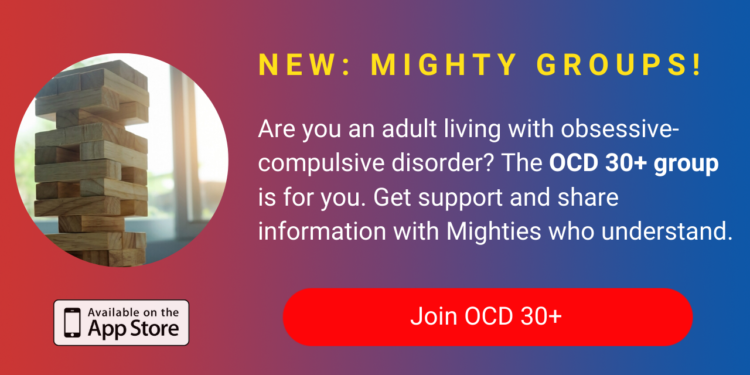You might have initially seen the word OCD (obsessive-compulsive disorder) and assumed this would be another article about OCD simply being a fear of germs and a splash of keeping things neat and tidy.
It’s not. Sorry. My housemates can tell you that chaos and mess seem to follow me around no matter how hard I try to keep things under control, and I don’t really care about germs any more than the average person.
What absolutely destroys my brain is the idea of hurting another person, no matter how remote that possibility could be. I have a subtype of OCD that centers far more on intrusive thoughts than the compulsions typically portrayed in the media, and the majority of my thoughts revolve around the fear of harming someone else. When I was younger, my brain could spiral into days of intense distress at the simplest of things. Accidentally kicking a pebble on the pavement would invoke an influx of intrusive thoughts, each of them coming with a huge amount of guilt and the certainty that consequences of this small action would be my fault.
What if someone trips over it, hits their head and dies?
What if it somehow causes a huge car crash that kills dozens of people?
Did I somehow, subconsciously, want people to die?
Rationally, these thoughts are abjectly ridiculous, but that didn’t stop them from entirely consuming me with fear and guilt. As much as I got a lot of this substantially under control as I grew up, there can be triggers that bring a lot of it back (looking at you, coronavirus). The idea that we can spread a potentially fatal disease without knowing we have it is scary to anyone who cares at least a little bit about other people, but it’s also something that my OCD thrives on. Since COVID-19 took hold, everything has been pretty terrifying.
Simple things, such as going to the supermarket, became a very elaborate exercise. Was what I needed to buy “essential” enough to risk infecting every other person in the shop? Did I actually deserve to buy food if it meant risking other people’s health? The answer my brain always gave me was no, because however unlikely the awful consequences my brain created were, I couldn’t rule them out. This made justifying a trip to the supermarket nearly impossible, and I was consumed by the guilt of it for a significant amount of time before and after actually attempting it. In my head, entering each shop was tantamount to murder.
Or take the example of going for a walk. Could I absolutely guarantee that the entire thing would be socially distanced? That someone wouldn’t decide to approach me in a place where I couldn’t maintain distance? That I wouldn’t have to touch something, like a gate or the button at the traffic lights? That potentially infected air I breathed out wouldn’t later enter into a passerby’s lungs? No. No amount of precautions, face masks, or hand gel could reassure that part of my brain that I wouldn’t unintentionally be responsible for a catastrophe.
In times where I have little to distract myself with, my brain often ends up free-styling, which is never a good thing. It circles around all the people I have glanced at that day, wondering if they’re going to end up in hospital because of me. The “what if” questions are endless. What if I didn’t quite wash my hands perfectly enough when I came back from the shops, and now I’ve infected everyone I live with, and they’ve infected everyone they’ve seen or worked with? What if I touched my mask without consciously realizing, and went on to infect the things I had to touch? What if I could have walked a slightly quieter route, or gone earlier in the morning, to minimize the amount of people I could have accidentally killed? Of course, to some extent, these thoughts are healthy and normal, and demonstrate compassion for the people around you, which is undoubtedly a good thing. Where the problem lies, however, is when this dominates your brain space and looms over everything else in your life.
As well as terrifying, it’s straight up exhausting to have this happening inside my head the whole time, on top of trying to be a vaguely functioning person. In pre-pandemic life, for the most part, I was able to reassure myself that thoughts like these were just a consequence of the way my weird brain is wired. I could mostly put the thoughts in the I-know-this-is-an-intrusive-thought box in my brain, where I could pretty much ignore them till they went away.
Since the start of COVID, however, with everything from the government to road signs to adverts on the TV telling me to take extra precautions, it was very easy for my brain to take this too far and believe that its warped perceptions of the world were right all along.
I’m still trying to work out what “too far” actually is, because when I’m struggling my brain finds it almost impossible to differentiate between reasonable precautions and completely unreasonable compulsions based on potential situations that have a minuscule chance of actually happening. Using the people I trust around me as a barometer for what is appropriate helps me to calibrate myself, but this doesn’t prevent the guilt from surfacing, and it doesn’t prevent the hours of indecision as I try to determine what the “correct” action to take is.
This isn’t to say that the precautions being advised aren’t absolutely necessary — they are, and the fact that they disproportionately affect people like myself doesn’t make them any less necessary. But, to my OCD pals out there struggling through this — you aren’t alone, I see how hard you’re trying, and I’m proud of you.
This piece originally appeared on Medium.
Getty image via Drazen Zigic


